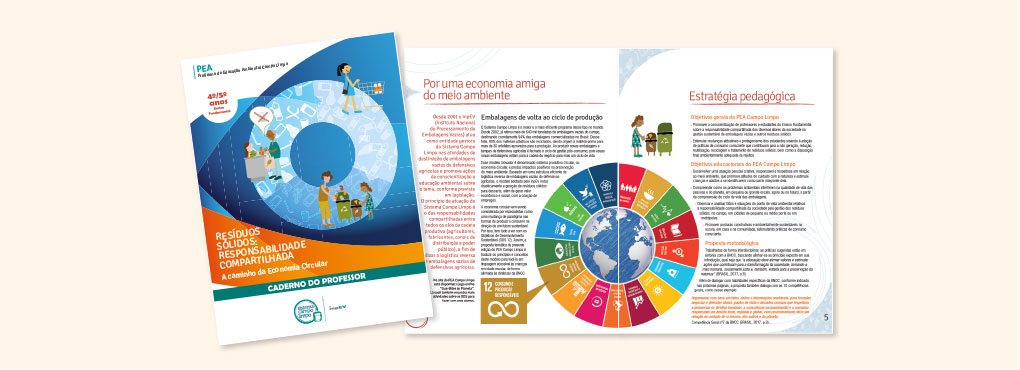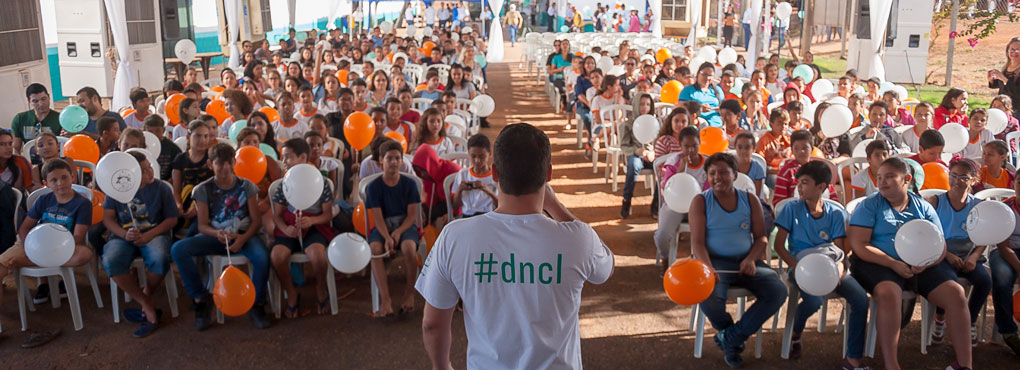The event celebrates the National Clean Field Day at the Rondonópolis (MT) receiving station.
GRI 103-2 and 103-3
inpEV goes beyond awareness development actions, which focus on farmers, and its main objective is to stay engaged with this public concerning the correct disposal of empty crop protection packaging. This work extends to other audiences as is the case of communities in which the receiving units operate. The results are systematically monitored by the Communication and Educational area and set the groundwork for future strategies.
PEA: A UN REFERENCE GRI 413-1
In 2019, the Campo Limpo Environmental Educational Program (PEA) was acknowledged by the United Nations Department of Economic and Social Affairs (UN DESA) as a good practice in disseminating the Sustainable Development Goals (SDGS).
Every year, the PEA distributes educational kits to be used with 4th and 5th grade Elementary School students in communities neighboring the receiving stations of the Campo Limpo System. In 2019, of the 107 stations, 106 (98%) were enrolled in the program. The PEA continued bringing solid waste management as a main topic and included, in 2019, the link with the SDGS which, in an educational and interactive way, sought to raise awareness of students as to the importance of the global agenda and how everyone in society is responsible for preserving quality of life and the environment. The communication materials also provided tips to help students, their families and school and community members to contribute with mindful consumption practices.
106 receiving stations helped disseminate the PEA to more than 240,000 students from over 2,500 schools in 2019.
With the theme “Solid waste: a shared responsibility”, the program sought to encourage student leadership in 2019. Another innovation was the alignment of the educational content with the Common Base National Syllabus (BNCC).
During the year, 9,000 educational kits were distributed to 240,622 students from 2,571 schools in 324 cities (the PEA number for the last three years can be found on the following page). In 2020, the central theme continues to be solid waste management and dissemination of the circular economy concept will be emphasized. The SDGS will also continue to be part of the educational syllabus.

PEA 2019 also addressed the 17 Sustainable Development Goals
PEA beneficiaries
PEA ARRIVES AT THE SÃO PAULO CAPITAL
Since solid waste management is also a challenge for large cities, in 2019 inpEV took the PEA to more than 70 public schools of the city of São Paulo, the largest metropolis in South America. With this initiative inpEV had the opportunity to demonstrate the effectiveness of the Campo Limpo System and contribute towards sustainable agricultural production, besides setting a successful example of reverse logistics and circular economy to students inserted in a different reality than that of the field. In 2020, the PEA will continue in the city of São Paulo.
PARTICIPATION IN THE NATIONAL CLEAN FIELD DAY GRI 413-1
The National Clean Field Day (DNCL), celebrated on August 18, is the main mobilization moment of all link representatives of the agricultural chain. In 2019, the 15th anniversary of the event, more than 78,000 people participated, surpassing the number recorded during the preceding year. The official ceremony was organized at the receiving station of Bebedouro (SP), managed by Coopercitrus (Rural Producers’ Cooperative).
With the theme “Together, sowing clean fields”, 102 receiving stations (94% of the total), located in 22 states of Brazil, celebrated this date, with the completion of 411 activities. Also addressing environmental education and awareness, the event offers activities in specific areas: University DNCL, with actions designed for students; DNCL Field Day, intended for farmers in a commemorative fashion; DNCL Open Doors, which invites the communities near the receiving stations to learn more about how the stations work; DNCL Community Action, which organizes activities such as cleaning and maintaining public squares, cleaning river banks and planting seedling greenhouses, among other actions; and DNCL Ceremonies, which counts on the presence of local public authorities.
FARMER AWARENESS
inpEV also promotes periodic campaigns to encourage farmer engagement and advise them on their responsibility in returning the empty packaging and adequate storage procedures. In 2019, two actions set the spotlight on the return of packaging lids. Another campaign reinforced the importance of the triple wash as a procedure prior to returning the packaging.
NEW E-LEARNING PLATFORM (EAD)
The Campo Limpo System online course, available on the inpEV website, started being hosted on a new platform in 2019 and gained more resources and tools, which made learning even more interactive, user-friendly and attractive. This course, which can also be taken on a smartphone or tablet, includes information about the relevant legislation, the responsibilities of each link in the chain and how the System works.
Since the new platform was launched, more than 2,200 people have already enrolled and around 1,600 have completed the course. In 2019, inpEV presented the online course to the workers of member companies and distributors, seeking to encourage them to become advocates of the concepts involving the Campo Limpo System. This training course can be taken by students and logistics professionals from other sectors and the public at large.
